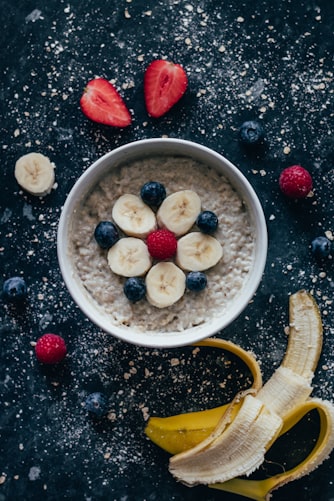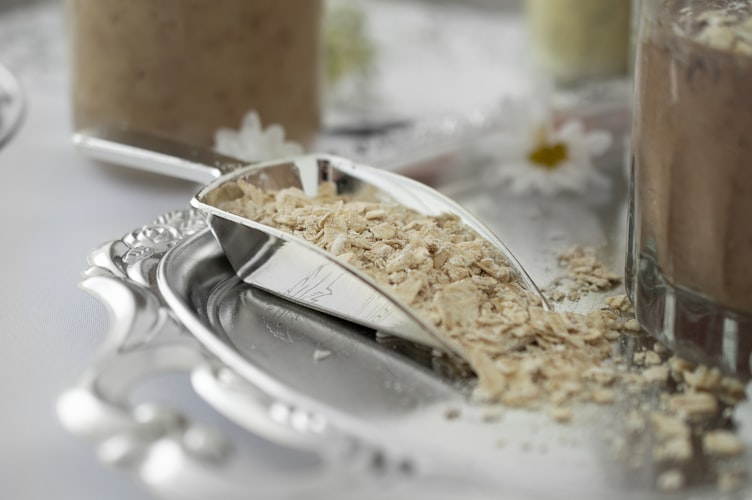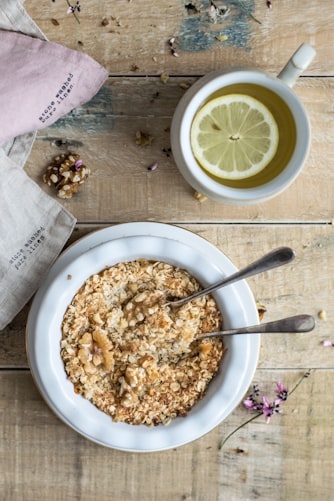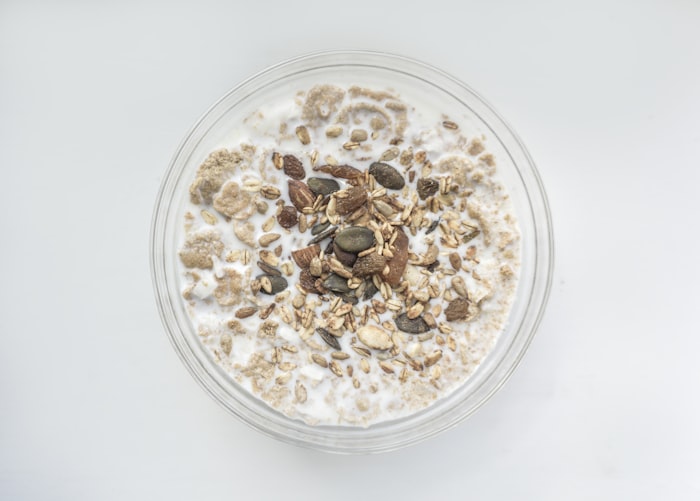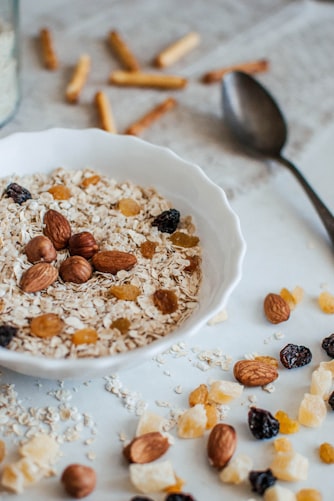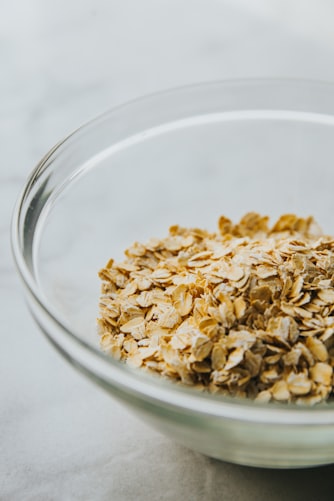
Oatmeal is an excellent choice for a post-workout meal. There is a healthy amount of carbohydrates and plant-based protein in oatmeal, which makes it an effective choice in replenishing muscles. Oatmeal is a rather heavy meal, which can make it difficult to digest before a workout. It is best eaten when you have at least an hour to digest the meal properly. Though there are some negatives to relying on oatmeal as a pre-workout meal, we will look further into the advantages of oatmeal when eaten both pre and post-workout.
Considered a popular choice amongst athletes and bodybuilders, oatmeal has been praised almost like a fad pre-workout meal. However, when you consider pre-workout meals, it has been noted that skipping oatmeal could actually lead to better performance.
There are so many reasons why oatmeal is such a popular consideration for both as a pre and post-workout meal; it inexpensive and readily available. It is easy to prepare the meal and is relatively easy to carry with you to the gym or your workout location. This added to the fact that this fortified whole-grain provides a great combination of nutrients has made it a popular pre-workout and post-workout meal.
However, when is the best time to eat oatmeal, before a workout or after a workout? We will look at the various aspects of how eating oatmeal before and after a workout affects your performance, simultaneously looking at how oatmeal helps with weight loss and muscle building. Lastly, we will consider which is better, oatmeal or protein powder.
Oatmeal Pre-Workout
Oatmeal has been praised as a great pre-workout meal for those who are on the run. Simply adding some water, blueberries and almonds, makes for a great pre-workout meal that is easy to prepare. However, is oatmeal an effective meal to be eaten before a workout? Does it boost performance, or hinder it?
The answer to this question depends on when you prefer eating your pre-workout meal. If you like eating a banana right before you start a run or hit the weights, we do not recommend that you do the same with oatmeal. This is because oatmeal is a rather heavy meal that takes time to digest. It could take you up to four hours to completely digest oatmeal in your body. Hence if you don’t at least have an hour to award to the proper digestion of the meal, we do not recommend oatmeal as a pre-workout meal.
Even eating oatmeal an hour before a workout could make you feel sluggish. This is due to the blood flow between your stomach and that competing to supply your working muscles with nutrients. Hence, there is an element of competition for resources within the body. This primarily happens when you are still digesting the food ingested, thereby requiring your body to still provide for the digesting mechanism. This can lead to various gastrointestinal issues and may even cause you to require using the bathroom in the middle of your workout (awkward). This can be especially important for athletes with sensitive guts.
Though as listed by Men’s Journal, a bowl of oatmeal with all the toppings may seem like a treat for pre-workout athletes, it could really hamper the progress of your workout. Think about it, you don’t always feel like running or lifting weights right after a big meal; this is what oatmeal does. It puts your body into hibernation mode, slowly digesting the meal in a slow burn process which otherwise would be great for your general health. However, when it comes to pre-workout meals, though oatmeal has been praised in the past and have been listed above by Men’s Journal, we do recommend other choices which could work better for your performance.
The point is this, when you are considering a pre-workout meal, you have to consider something with a good amount of healthy carbohydrates and protein. Oatmeal has both these components, which is why is it considered such a popular choice amongst many athletes when it comes to pre-workout meals. It is the fibre content that could make you feel sluggish, thereby preventing you from performing at your utmost level.
That being the case, oatmeal is an excellent source of energy and for those who would still consider oatmeal as a pre-workout meal, there is nothing wrong with it, so long as you don’t mind feeling a bit sluggish. However, we do recommend that you give your body sufficient time to digest the meal before starting your workout. Otherwise, we do recommend something along the lines of a quick energy source such as a granola bar, crackers or a piece of toast.
Oatmeal Post-Workout
There are various reasons why oatmeal is a great post-workout meal. In comparison to pre-workout oatmeal, you have a lot more to gain by eating oatmeal post-workout. Though oatmeal is not high on the glycemic index, it does provide your body with the necessary insulin boost, which enables effective glycogen replenishment in your body. The short-term spike in insulin levels in your body will assist in the faster transportation of nutrients such as amino acids and glucose to your muscles. Hence when it comes to oatmeal eaten post-workout, it works really well as a recovery meal, that many people do stand by.
After a tough workout, the muscles in your body may become inflamed due to the strenuous activity during a workout. Oatmeal contains a group of compounds called avenanthramides, which have been noted and praised for their anti-inflammatory activity. A study that was published in the European Journal of Applied Physiology illustrated how avenanthramides, as found in oatmeal, could help reduce the inflammatory response that is brought about in your muscles after a challenging workout. This bravely helps aid muscle recovery in your body, thereby making oatmeal a miracle post-workout meal.
An ideal post-workout meal should have carbohydrates and protein at a ratio of 2:1 or 3:1 (carbohydrates: protein). Oatmeal in fact contains just this ratio of carbohydrates and proteins, found at a ratio of 2:1. When you add some fruit or milk or chia seeds into the mix, the amount of antioxidants, fibre and healthy fats attained through the meal are further heightened.
Intense exercise has the tendency to suppress the immune response in your body, which too is resolved by eating oatmeal. Oatmeal contains a wholesome amount of beta-glucan, which is responsible for boosting your immune system. Not that you would catch a case of the sniffles after a workout, however eating oatmeal after a workout enables you to better regulate your body’s immune response, thereby maintaining the health of your body within optimum conditions.
Further to this, oatmeal is a rather filling meal, with a great amount of fibre. Eating oatmeal is more likely to keep you full for a longer period of time, which can be great if you are looking to burn more fat and lose weight. There is also a great amount of soluble fibre in oatmeal, which works really well in lowering cholesterol levels. Dr James W. Anderson of the University of Kentucky College of Medicine has praised whole grains such as oats in lowering cholesterol levels.
The avenanthramides as mentioned above have great anti-inflammatory properties, which not only aid in muscle recovery but play a pivotal role in lowering the risk of developing heart disease. These avenanthramides help lower blood pressure by boosting the production of nitric oxide, which is perfect for athletes who look to exert themselves physically during a workout.
All in all, oatmeal as a post-workout meal works wonders for you and should definitely be included in your arsenal. Not only will it provide your body with everything it needs for a quick and effective recovery, but it will prevent various chronic conditions which may develop otherwise due to unhealthy eating habits. Not only will you keep your cholesterol in check, but you will also effectively sidestep heart disease and high blood pressure.
Oatmeal for Adding Muscle
Quaker Instant Oatmeal packs in 16 grams of proteins in every 100-gram serving. This is a wholesome amount of plant-based protein which can be an excellent source, especially for those on a plant-based diet.
We know that when it comes to building muscles, it is all about the protein content. In fact, some trainers have praised oatmeal in combination with egg whites as a great boost in building muscle mass.
When eaten first thing in the morning, oatmeal works to provide your body with a great amount of steady energy, which is fantastic when you consider your workouts later in the day. Not only does it kick start your metabolism in the best possible way, but it is low in fat, in comparison to other foods that are rich in energy. Foods that are rich in energy usually contain saturated or trans fats which can be extremely bad for your health.
This is why oatmeal is great when you consider building muscle because it keeps the bad stuff out while providing your body with all the natural goodness. Loaded with vitamins and minerals, when it comes to bulking and adding muscles, oatmeal is probably one of the most effective plant-based sources of protein.
Oatmeal for Weight Loss
Oatmeal is a great way to jump-start your metabolism. The energy boost that you get from oats eaten a sufficient spacing to working out will not only improve your metabolism but will help improve your workouts too.
Oatmeal is a great low-glycemic index food, which can be an effective tool in your weight loss journey. Not only is it low in the glycemic index, but it is also high in fibre, which means it will keep you full for a longer period of time. In fact, eating oatmeal after a workout not only provides your body with the boost of energy it needs and provides your body with a significant source of nutrients; it also sustains the feeling of fullness for a long period of time, thereby preventing you from snacking or other unhealthy eating habits.
That being the case, when you are eating oatmeal in order to lose weight, you have to keep the toppings that you place on your oatmeal in check. Adding sugar and chocolate chips and even milk could greatly increase the number of calories of the meal, thereby making it less effective with your weight loss ambitions. In order to ensure that you get the most out of your meals, enjoy oatmeal with fruits, nuts and seeds, which will provide a nutritional boost, thereby aiding weight loss.
All in all, when it comes to weight loss, oatmeal surely has some great benefits to offer you. Not only is it a reliable source of healthy carbohydrates, but it can also be a great low-calorie meal, that is perfect for those looking to lose weight.
Oats or Protein Shake?
Due to the high concentration of protein in protein shakes, your muscles will recover and repair faster through protein shakes. However if you are looking to lose weight, then the protein shake does little good and doesn’t keep you as full as oatmeal would.
The answer as to which works better, oats or protein shakes depends solely on your fitness ambitions. As mentioned above, if are you looking to lose weight then the highly nutritious, fibre-based oatmeal would enable you to stay full for a longer period of time, thereby preventing you from unhealthy eating patterns which could lead to weight gain. However, if you are looking to add muscle, then a high-quality protein shake would provide your body with a good source of protein to build muscle fast. Hence the answer to the question completely depends on what your fitness ambitions are.
That being the case, there are plenty of people who are looking to gain muscle however use oatmeal as a post-workout recovery meal. This is because it is an excellent source of plant-based protein, with all the benefits it has when eaten after a workout as listed herewith in this article. When looking to gain muscle, you could even benefit from adding your protein powder to your oatmeal, thereby getting the best of both worlds.
Obvious to state, you don’t have to choose between the two and could consider incorporating both. However, this again depends on whether you are looking to lose fat or add muscle. Even on a weight loss plan, a good and healthy amount of protein is essential for muscle maintenance. However, this amount of protein can be directly consumed through diet alone.
Thus, unless you are trying to add muscle, then the obvious choice of a post-workout, recovery meal would be oatmeal. If you prefer, you could mix in your favourite protein powder, straight into the oatmeal for better results
Post-Workout Oatmeal Recipe
When it comes to post-workout oatmeal recipes, there is plenty to go with. However, it is important to ensure that you don’t add sugar or high glycemic index toppings to prevent excessive insulin spikes after a workout, which could do more damage than good. When it comes to toppings, there is a wide variety of fruits, nuts and seeds which works really well on oatmeal.
Here is our favourite pick of Post-Workout Oatmeal Recipes, brought to by, Joe Cross.
‘Ingredients
- 1/2 cup rolled oats
- 1 cup water
- Dash salt
- 1 tbsp chia seeds
- ½ cup blackberries (or other berries)
- 1-2 tbsp coconut shreds
- 1-2 tbsp walnuts
- (optional) honey for sweetening
Directions
- Add oats, water and salt to a small pot and bring water to boil.
- Once the water boils, add chia seeds and mix into the oats and water mixture. Continue to cook for 5-7 minutes, stirring occasionally until oatmeal is of desired thickness.
- Serve oatmeal into bowl and garnish with toppings.
- Add optional sweetener if desired — then eat and enjoy!
Prep Time: 5-10 minutes
Total Time: 5-10 minutes
Servings: 1 serving’
Source: Joe Cross
The Truth About Oatmeal and Your Workouts
When it comes to your workouts, you want the best meals which will provide you with the best results. Though oatmeal can provide a great boost of energy which usually sustains itself throughout your workout; when eaten too close to your workout, it could cause gastrointestinal issues. Hence, when it comes to using oatmeal as a pre-workout meal, be sure to provide yourself with at least an hour to properly digest the meal before you start your workout.
As mentioned in this article, oatmeal when eaten after a workout can do wonders for your body and help your muscles recover much faster. A healthy amount of carbohydrates as found in oatmeal will help you regain your energy levels and will work to provide your muscles with the nutrients that are needed to recover faster. All in all, oatmeal is a great choice of a post-workout meal and is sure to help you lose weight and even gain muscle mass.
Though there are oatmeal diets that promise better weight loss, we do not recommend them due to the fact that they may cause malnutrition. Oatmeal diets usually require you to eat three servings of oatmeal per day. This may prevent you from eating anything else, thereby withdrawing your body of essential nutrients which are normally sourced from a balanced diet.
We do hope that reading this word to word has provided some good insight into when you should ideally eat your oatmeal, to get the best results from your workout. If you were after a great recovery meal, then for sure, oatmeal works wonders in helping propel your further. Not only will it boost performance, but it will also definitely show your results.
Happy Munching!




